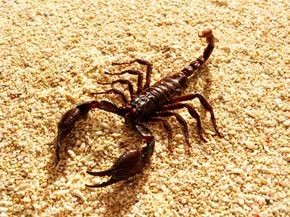Scorpions, found across diverse habitats from rainforests to deserts, are masters of survival. They typically conserve energy by hiding under rocks and logs, and while they possess multiple eyes, their eyesight is poor. To compensate, they rely on sensory feelers called pectines on their abdomens to detect scent trails and air movement.
 Scorpion hiding under a rock, demonstrating its energy conservation strategy
Scorpion hiding under a rock, demonstrating its energy conservation strategy
Scorpion Diet and Cannibalistic Tendencies
These nocturnal creatures are opportunistic feeders, preferring to wait for food rather than actively hunting. Scorpions are carnivorous arachnids, consuming insects and even other scorpions. This cannibalistic behavior can even occur during mating rituals, where a male scorpion may become a post-mating meal for the female if he doesn’t escape quickly enough after depositing a spermatophore. This behavior is similar to that of female black widow spiders.
The Remarkable Metabolic Adaptation of Scorpions
What allows scorpions to thrive in environments with limited food resources? One key adaptation is their ability to dramatically slow their metabolism. Scorpions can reduce their metabolic rate to as little as one-third that of similarly sized insects. During periods of scarcity, their metabolic rate is among the lowest of all invertebrates, allowing them to survive for extended periods on minimal sustenance. It’s been documented that one insect meal can sustain a scorpion for an entire year.
To achieve this metabolic slowdown, scorpions minimize activity, remaining inactive for 92 to 97 percent of their lives, essentially entering a state of prolonged hibernation.
External Digestion and Efficient Nutrient Extraction
Even in this slowed state, scorpions retain the ability to quickly mobilize and capture prey. However, they don’t immediately consume their meal. Instead, they employ external digestion, excreting enzymes through their fangs, or chelicerae, to break down the insect matter before ingestion. This process allows the scorpion to maximize nutrient extraction from its food while minimizing the energy expenditure associated with internal digestion.
Longevity and Infrequent Meals
This combination of lethargy, metabolic adaptation, and efficient digestion allows scorpions to live up to 25 years in various climates, making them the longest-living arachnid species. Ironically, a scorpion reaching this advanced age may only consume a few dozen meals throughout its entire lifespan. This answers the core question: How Long Can Scorpions Live Without Food? The answer is, remarkably, over a year.
Scorpion Venom: A Potential Cancer Treatment
Intriguingly, scorpion venom is being explored for potential medical applications, specifically in cancer treatment. A protein found in the venom has shown promise in targeting cancer cells. When attached to radioactive isotopes, this protein can selectively bind to cancer cells, potentially leading to their destruction. While research is ongoing, early studies have indicated that terminal brain cancer patients receiving high doses of this venom-derived treatment experienced a modest increase in lifespan.
In conclusion, scorpions exhibit an impressive set of adaptations that enable them to survive extended periods without food, making them truly remarkable creatures.